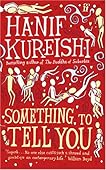 Something to Tell You by Hanif Kureishi
Something to Tell You by Hanif KureishiA well-written, amusing and titillating novel that works well as entertainment but is unlikely to haunt you for ever. The setting is London in the mid-Noughties. The protagonist is a psychoanalyst with a mildly criminal past and some interestingly original views on morality and pleasure. He, however, would be the first to admit that he doesn't have all the answers; indeed, he uses this cop-out regularly in his relationships with family, friends and patients.
There is lots and lots of sex, both hetero and homo, nearly all of it kinky. The gay sex seems to me more realistically and lovingly imagined the hetero stuff, which tends to be more distantly observed.
My main criticism of this generally fine novel is that the bits of the protagonist's character don't quite fit together. This is a shame since the first-person narrative voice conferred on him by the author is strong and convincingly individual. Against this literary weakness, however, must be set a nowadays rare and very desirable strength; namely that the book has a proper ending, a conclusion that ties up all the loose ends and presents the reader with a dramatic and satisfying conclusion. Too many modern literary novels disappoint us with their endings: everything goes swimmingly until the last fifty pages, then it all starts to unravel, or just collapses. Hanif Kureishi nimbly avoids this pitfall to deliver a novel that delivers from start to finish.
Oh, and Mick Jagger makes a cameo appearance. With his clothes on, just in case you were wondering.
